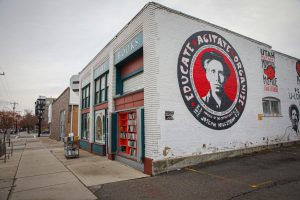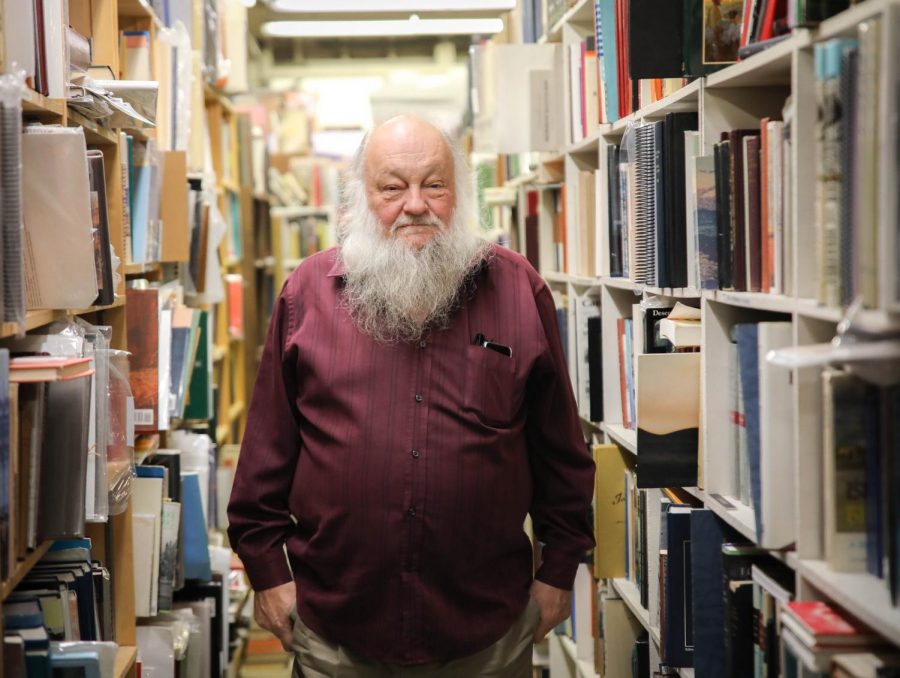Christopherson: Local Bookstores Need Us to Survive the Coronavirus Outbreak – and We Need Them
Ken Sanders, owner of Ken Sanders Rare Book Store, on Thursday, Jan. 30, 2020, in Salt Lake City. (Photo by Cassandra Palor | Daily Utah Chronicle)
April 17, 2020
It’s no secret that Amazon.com has been putting small, independent bookstores across the country (and even chains like Barnes & Noble) out of business for years – but now, as the massive e-commerce company scrambles to make urgent deliveries of hand sanitizer, toilet paper and other necessities in response to the coronavirus pandemic, book orders have moved toward the bottom of its priority list.
At the same time, many of us have more time on our hands than we know what to do with (that is, if we’re following CDC guidelines to stay home to avoid spreading the coronavirus) and need books more than ever, both to keep us busy and help us navigate our fear, sadness and uncertainty. With non-essential Amazon deliveries weeks slower than usual, that means we suddenly need our local bookstores as much as they need us.
Of course, we’ve needed independent bookstores all along, though we may not have realized it. They play a key role in our communities, especially here in Salt Lake City. We’re lucky to have a handful of small booksellers within our city limits and not far from campus, including Ken Sanders’ Rare Books, The King’s English, Weller Book Works, Golden Braid Books and Central Book Exchange. These companies each leave a unique stamp on their respective neighborhoods, hosting readings by poetry clubs and local authors (sometimes including our own University of Utah professors), re-selling previously loved books to new readers and otherwise fostering communities of book lovers in their pockets of the city.

Like other local businesses, our bookstores are also integral to Salt Lake City’s economic health, recirculating roughly 52% of their revenue back into the local economy. And like other local businesses, they are seriously threatened by the coronavirus.
Normally, the appeal of shopping for books locally rather than on Amazon, at least for me, is tied mostly to the experience of browsing in a brick and mortar shop. I like to block out a couple of hours every time I visit The King’s English — I take my time flipping through titles, considering the shelf of bookseller recommendations and enjoying the colorful space. I ask for advice in making book selections for my friends and family around Christmas and birthdays, knowing I’ll inevitably be led to something for myself too. I love walking through the beautiful Harvard Yale neighborhood on my way to the store and usually buy a mini Utah Truffle with my books to eat on the bus ride home.
Right now, none of that is possible — but the appeal of Amazon as a bookseller has also been lost for the time being, as the company puts off deliveries, normally near-immediate thanks to their two Utah fulfillment centers, of non-urgent items to accommodate more critical needs. Libraries are closed too, which means buying from local bookstores online or over the phone is the fastest way to a good read during this crisis.
The Salt Lake Tribune recently published a guide to supporting our local booksellers during the coronavirus outbreak, with details on the current hours and operations at each store. Whether your personal favorite — or, if you’re normally an Amazon shopper, just the one closest to you — is offering curbside pickup or home deliveries, your support is more critical to their survival now than ever. If you’re lucky enough to have a reliable source of income — and many are not — consider sharing the wealth (or whatever’s normally in your budget for eating out) with one of Salt Lake’s independent bookstores. Our communities depend on them, and, as we all look for solace and distractions from the chaos around us, so do we.








